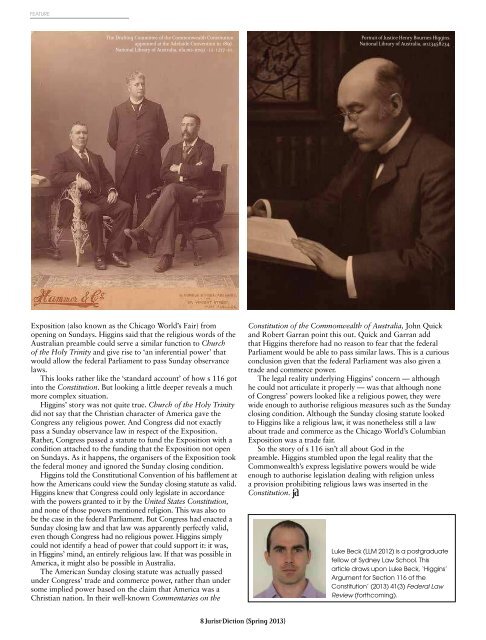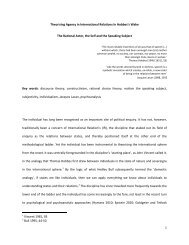PeoPLe, PoLicieS And PLebiSciteS: reforming the conStitution
PeoPLe, PoLicieS And PLebiSciteS: reforming the conStitution
PeoPLe, PoLicieS And PLebiSciteS: reforming the conStitution
Create successful ePaper yourself
Turn your PDF publications into a flip-book with our unique Google optimized e-Paper software.
feature<br />
feature<br />
The Drafting Committee of <strong>the</strong> Commonwealth Constitution<br />
appointed at <strong>the</strong> Adelaide Convention in 1897.<br />
National Library of Australia, nla.ms-ms51-12-1277-s1.<br />
Portrait of Justice Henry Bournes Higgins.<br />
National Library of Australia, an23458234.<br />
Exposition (also known as <strong>the</strong> Chicago World’s Fair) from<br />
opening on Sundays. Higgins said that <strong>the</strong> religious words of <strong>the</strong><br />
Australian preamble could serve a similar function to Church<br />
of <strong>the</strong> Holy Trinity and give rise to ‘an inferential power’ that<br />
would allow <strong>the</strong> federal Parliament to pass Sunday observance<br />
laws.<br />
This looks ra<strong>the</strong>r like <strong>the</strong> ‘standard account’ of how s 116 got<br />
into <strong>the</strong> Constitution. But looking a little deeper reveals a much<br />
more complex situation.<br />
Higgins’ story was not quite true. Church of <strong>the</strong> Holy Trinity<br />
did not say that <strong>the</strong> Christian character of America gave <strong>the</strong><br />
Congress any religious power. <strong>And</strong> Congress did not exactly<br />
pass a Sunday observance law in respect of <strong>the</strong> Exposition.<br />
Ra<strong>the</strong>r, Congress passed a statute to fund <strong>the</strong> Exposition with a<br />
condition attached to <strong>the</strong> funding that <strong>the</strong> Exposition not open<br />
on Sundays. As it happens, <strong>the</strong> organisers of <strong>the</strong> Exposition took<br />
<strong>the</strong> federal money and ignored <strong>the</strong> Sunday closing condition.<br />
Higgins told <strong>the</strong> Constitutional Convention of his bafflement at<br />
how <strong>the</strong> Americans could view <strong>the</strong> Sunday closing statute as valid.<br />
Higgins knew that Congress could only legislate in accordance<br />
with <strong>the</strong> powers granted to it by <strong>the</strong> United States Constitution,<br />
and none of those powers mentioned religion. This was also to<br />
be <strong>the</strong> case in <strong>the</strong> federal Parliament. But Congress had enacted a<br />
Sunday closing law and that law was apparently perfectly valid,<br />
even though Congress had no religious power. Higgins simply<br />
could not identify a head of power that could support it: it was,<br />
in Higgins’ mind, an entirely religious law. If that was possible in<br />
America, it might also be possible in Australia.<br />
The American Sunday closing statute was actually passed<br />
under Congress’ trade and commerce power, ra<strong>the</strong>r than under<br />
some implied power based on <strong>the</strong> claim that America was a<br />
Christian nation. In <strong>the</strong>ir well-known Commentaries on <strong>the</strong><br />
Constitution of <strong>the</strong> Commonwealth of Australia, John Quick<br />
and Robert Garran point this out. Quick and Garran add<br />
that Higgins <strong>the</strong>refore had no reason to fear that <strong>the</strong> federal<br />
Parliament would be able to pass similar laws. This is a curious<br />
conclusion given that <strong>the</strong> federal Parliament was also given a<br />
trade and commerce power.<br />
The legal reality underlying Higgins’ concern — although<br />
he could not articulate it properly — was that although none<br />
of Congress’ powers looked like a religious power, <strong>the</strong>y were<br />
wide enough to authorise religious measures such as <strong>the</strong> Sunday<br />
closing condition. Although <strong>the</strong> Sunday closing statute looked<br />
to Higgins like a religious law, it was none<strong>the</strong>less still a law<br />
about trade and commerce as <strong>the</strong> Chicago World’s Columbian<br />
Exposition was a trade fair.<br />
So <strong>the</strong> story of s 116 isn’t all about God in <strong>the</strong><br />
preamble. Higgins stumbled upon <strong>the</strong> legal reality that <strong>the</strong><br />
Commonwealth’s express legislative powers would be wide<br />
enough to authorise legislation dealing with religion unless<br />
a provision prohibiting religious laws was inserted in <strong>the</strong><br />
Constitution.<br />
Luke Beck (LLM 2012) is a postgraduate<br />
fellow at Sydney Law School. This<br />
article draws upon Luke Beck, ‘Higgins’<br />
Argument for Section 116 of <strong>the</strong><br />
Constitution’ (2013) 41(3) Federal Law<br />
Review (forthcoming).<br />
Constitutions Matter<br />
Sydney Law School’s Constitutional Reform<br />
Workshop in Myanmar<br />
In November 2011, Wojciech Sadurski met with Aung San<br />
Suu Kyi, leader of <strong>the</strong> National League of Democracy<br />
and Nobel Peace Prize laureate, at her home in Yangon,<br />
to discuss <strong>the</strong> <strong>the</strong>n political situation in Myanmar.<br />
He found a determined and pragmatic leader, willing<br />
to learn from outside experience, and sensitive to <strong>the</strong><br />
delicate balance between constitutional preservation and<br />
innovation, doctrine and design.<br />
‘We have <strong>the</strong> great advantage that we are starting from almost<br />
nothing,’ Suu Kyi said, ‘and if you are starting from almost<br />
nothing you can learn from <strong>the</strong> mistakes of o<strong>the</strong>rs. We can learn<br />
from your mistakes, as well as from your successes.’<br />
Eighteen months later, in May 2013, a three-day workshop<br />
on constitutional reform under <strong>the</strong> auspices of <strong>the</strong> Sydney Law<br />
School was held in Yangon, Myanmar.<br />
Mekela Panditharatne<br />
The project involved a team of eminent constitutional experts<br />
led by Sadurski, Sydney Law School’s Challis Professor of<br />
Jurisprudence. It focused on <strong>the</strong> experience of constitutional<br />
reform in transitional democracies, drawing on expertise from<br />
various academic institutions including Sydney Law School, <strong>the</strong><br />
UNSW School of Law, <strong>the</strong> National University of Singapore<br />
School of Law, <strong>the</strong> ANU College of Asia and <strong>the</strong> Pacific, and <strong>the</strong><br />
University of Victoria School of Law (Canada).<br />
A diverse cross-section of Myanmar society attended <strong>the</strong><br />
workshop, including Aung San Suu Kyi and o<strong>the</strong>r senior<br />
members of <strong>the</strong> National League for Democracy and key figures<br />
8 Jurist·Diction {Spring 2013} Jurist·Diction {Spring 2013} 9
















